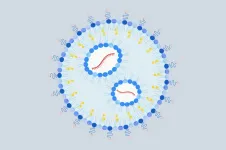(Press-News.org) COLUMBUS, Ohio – A new approach to trauma-informed care developed by domestic violence survivor advocates and researchers at The Ohio State University has been found in a new study to improve support organizations’ care for survivors by better recognizing brain injury and addressing its often long-lasting repercussions.
The study appears in the Journal of Head Trauma and Rehabilitation.
CARE is the first trauma-informed approach that considers brain injury in the complex set of circumstances to be addressed and accommodated in order for domestic violence survivors to access safety, health and social services. It was created in response to 2019 work by Ohio State researchers and the Ohio Domestic Violence Network that found 8 in 10 survivors seeking help have suffered head injuries and strangulation by their abusers.
“Given the pervasiveness of the problem, agencies should be ruling brain injury out, as opposed to ruling it in, and approaching their work with tools to appropriately support these survivors,” said Julianna Nemeth, the study’s lead author and an assistant professor in Ohio State’s College of Public Health.
“These injuries are contributing to common struggles experienced by survivors, including engaging and following through with services and planning for significant life changes. And they are contributing to mental health, substance use and other health concerns.”
The CARE model is based on four cornerstones:
Connect with survivors by forming genuine relationships and learning what survivors value, want, need and expect.
Acknowledge that head trauma and strangulation, and related challenges, are common, including brain injury, mental health struggles, substance use and suicidal ideation.
Respond by collaborating with survivors to develop accommodations for challenges related to suspected brain injury caused by violence and provide effective, accessible referrals and advocacy.
Evaluate services provided by establishing a strong feedback loop with survivors to see how, and to what extent, the support, accommodations, resources, referrals and services are meeting their needs.
“CARE tools are intended to be used flexibly by domestic violence program staff to open conversations and provide information about head trauma, strangulation and mental health struggles – and help survivors identify short-term and long-term consequences of brain injury and trauma,” Nemeth said.
The research team interviewed 53 staff members, including some volunteers, at five Ohio domestic violence organizations prior to implementation of CARE, and 60 staff members a year after the organizations implemented the approach. The majority of staff indicated that after CARE implementation they felt more confident and comfortable and had more conversations with survivors about head injuries and strangulation.
“These tools help staff proactively recognize these injuries, which can manifest themselves in a variety of ways that present challenges in the daily lives of survivors, and in their ability to access lifesaving services,” Nemeth said.
Though there is growing evidence of brain injury among domestic violence survivors, and recognition of the pervasiveness of the problem is growing nationally, agencies that serve survivors largely still have a long way to go to fully and effectively address brain injury, Nemeth said. The CARE tools are free for download, were designed to be used by people with no formal health training and now have evidence to back them up, she said.
Nemeth said she and her colleagues are hopeful that the CARE framework can help not only staff who work in domestic violence shelters, but those who come in contact with survivors elsewhere and play a role in their health, safety and life circumstances – including the justice system, health care providers and social service organizations.
“Trauma-informed care, including the CARE model, is marked by the entire organization’s ability to be flexible with people and recognize that their current situation may have to do with both traumatic incidents that have happened directly to them and also inter-generational trauma and community trauma,” she said.
“If we want to help them, we have to be flexible with people, and realize that their behavior may also be the result of coping with the troubles arising from an invisible injury.”
The success reported in this study is also important because it speaks to the ease of implementing and sustaining use of the CARE framework, Nemeth said.
“There’s a high degree of turnover in these agencies and while they received training at the beginning, sustaining the work was left to the agencies themselves. We saw that the agencies were able to take the information they had, and the support materials, and train new staff as they came in,” she said.
“All organizations that are working with survivors of violence really should consider the possibility of brain injury in providing services and accommodations. We know that one in four women in her lifetime will experience severe violence. This is a community problem. This is a public health crisis. This is not something that’s just for domestic violence shelters to address.”
Other researchers who worked on the study are Rachel Ramirez, Cathy Alexander and Emily Kulow of the Ohio Domestic Violence Network and Christina Debowski, Alice Hinton, Amy Wermert, Cecilia Mengo, Alexis Malecki, Allison Glasser and Luke Montgomery of The Ohio State University.
#
CONTACT: Julianna Nemeth, Nemeth.37@osu.edu
Written by Misti Crane, 614-292-3739; Crane.11@osu.edu
END
Impact Journals (Aging's publisher) is proud to participate at the American Association for Cancer Research (AACR) Annual Meeting 2023, which convenes April 14-19 in Orlando, Florida.
BUFFALO, NY-April 4, 2023 – Impact Journals will be participating as an exhibitor at the American Association for Cancer Research (AACR) Annual Meeting 2023 from April 14-19 at the Orange County Convention Center in Orlando, Florida. This year, the AACR meeting theme is: “Advancing the Frontiers of Cancer Science and Medicine.”
Impact ...
Many animals have evolved to tolerate extreme environments, including being able to survive crushing pressures of ocean trenches, unforgiving heat of deserts, and limited oxygen high in the mountains. These animals are often highly specialized to live in these specific environments, limiting them from moving to new locations. Yet, there are rare examples of species that once lived in harsh environments but have since colonized more temperate settings. Angel Rivera-Colón, a former graduate student now postdoc in the lab of Julian Catchen (CIS/GNDP), an associate professor in the department ...
Similar to how cells within human tissues communicate and function together as a whole, bacteria are also able to communicate with each other through chemical signals, a behavior known as quorum signaling (QS). These chemical signals spread through a biofilm that colonies of bacteria form after they reach a certain density, and are used to help the colonies scavenge food, as well as defend against threats, like antibiotics.
“QS helps them to build infrastructure around them, like a city,” ...
Living organisms produce a myriad of natural products which can be used in modern medicine and therapeutics. Bacteria and other microbes have become the main source for natural products, including a growing family called ribosomally synthesized and post-translationally modified peptides, or RiPPs. The labs of Douglas Mitchell (MMG), John and Margaret Witt Professor of Chemistry, and Huimin Zhao (CABBI/BSD/GSE/MMG), Steven L. Miller Chair of Chemical and Biomolecular Engineering, at the University of Illinois Urbana-Champaign have been working in tandem to identify and analyze new RiPPs that could be good candidates ...
Peanut allergies affect 1 in 50 children, and the most severe cases lead to a potentially deadly immune reaction called anaphylactic shock.
Currently, there is only one approved treatment that reduces the severity of the allergic reaction, and it takes months to kick in. A group of UCLA immunologists is aiming to change that.
Taking inspiration from COVID-19 vaccines as well as their own research on the disease, they created a first-of-its-kind nanoparticle — so small it’s measured in billionths of a meter — that delivers mRNA to specific cells in the liver. Those cells, in turn, teach the body’s natural defenses to tolerate ...
Haley Marks is a project scientist for the Advanced Light Microscopy Lab (ALMS) at the CNSI at UCLA. She is a biomedical engineer with a specialty in nano-biosensor research, translational medicine, and optics education.
Since joining CNSI in 2022, Haley has served as a technical expert, providing advanced light microscopy training and services to ALMS users. Here she works on developing and optimizing ALMS’s existing super-resolution and high-speed optical methods, developing strategies and imaging tools for in vivo imaging, and optimizing and disseminating computational imaging techniques.
Haley has a passion for all things photonics, and enjoys 3D printing, materials ...
A new study published in the CABI journal Human-Animal Interactions reveals that young dog owners tend to cope well when their beloved pooch misbehaves.
Past studies suggest that around 90% of dogs display undesired behaviours such as aggression and disobedience, but little is known about the impact of this on young people’s experiences and accompanying emotions.
A team of scientists interviewed young dog owners in Canada, aged 17 to 26 years, to try and determine their experiences with their pets and their coping strategies in response to bad behaviour.
This included barking occasional and persistent barking and, in extreme cases, being aggressive towards other dogs ...
Humans have a way of understandings others’ goals, desires and beliefs, a crucial skill that allows us to anticipate people’s actions. Taking bread out of the toaster? You’ll need a plate. Sweeping up leaves? I’ll grab the green trash can.
This skill, often referred to as “theory of mind,” comes easily to us as humans, but is still challenging for robots. But, if robots are to become truly collaborative helpers in manufacturing and in everyday life, they need to learn the same abilities.
In ...
How can we make wearable devices like Spiderman’s suit that are thin and soft yet also feature various electrical and optical functionalities? The answer lies in producing novel materials that go far beyond the performance of existing materials and developing technology that enables the precise control of the physical properties of such materials.
Separating transition metal dichalcogenide (TMD) into a single layer just like graphene makes it transform into a thin, two-dimensional (2D) film material that exhibits the characteristics of highly performing semiconductors. By stacking two disparate ...
Contrary to earlier research findings, people of power - think about politicians, celebrities or bullies in school - turn out to be no less concerned about their reputation, compared to those who have less influence and control within the society.
Previously, it has been assumed that since those who have the upper hand in the society - unlike the ‘powerless’ - are able to get away with commonly unacceptable behaviour (e.g. aggression and exploitation), would care less about any potential damages to their reputation.
However, a recent study by scientists at the University of Kent (United Kingdom) ...





